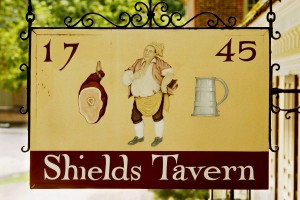
Throughout the eighteenth and early nineteenth centuries, taverns remained sites from which various collections of people launched campaigns against authority. Three decades later, Samuel Adams and John Hancock discussed their ideas for a far more famous conspiracy, the Boston Tea Party, in Boston's Green Dragon tavern. In New York City in 1741, for example, white and black patrons of John Hughson's harbor tavern launched the " New York Conspiracy" against the local mercantile and political elite in a quest for money and freedom, not just for slaves but also for the much larger population of poor whites.

More diverse populations, laborers who expected drink as a part of pay, a persisting tradition, railed against authority from tavern to street, and in both places they allied occasionally with aspiring, populist-leaning factional leaders. Magistrates rarely achieved the level of control over taverns they sought, however, and contesting over and in taverns among customers, keepers, and authorities became more evident from at least the late seventeenth century onward, especially in urbanizing areas. The fears of early American authorities were not unfounded dire consequences could and did result. They recognized that alcoholic beverages, which had some health benefits, could stimulate fights or worse, and that the frequent games of chance engaged in and feats of prowess displayed at taverns could lead not only to reputations made but also to the ruin of rank and resources. Legislation and local bylaws specified the prices tavern keepers could charge for everything from drink to stabling and the behaviors keepers were not to permit: disorderliness, excessive drinking, gambling, and, at times, loitering by seamen and laborers, and, in some places, visits from African slaves and native Americans.Īlso from the beginning, agents of official culture tied tavern regulation-or at least, their attempts at regulation-to economy and social order. The keeper was the "master," and after he or she paid a fee and offered a "surety," a bond backed up by others who knew and vouched for the individual, the keeper was responsible for providing particular services and for keeping order. Colonial legislatures often mandated their existence and tried to regulate what went on inside them, in part by requiring keepers to obtain licenses. In these public houses local courts met, commercial and social exchanges occurred, mail arrived, and a variety of contests played out in their rooms and on their grounds. Called "ordinaries" in some places, taverns provided food and drink, lodging, stabling, and news, much as similar institutions had in the Old World.

By the colonial and early national periods, taverns were common, especially in cities and towns, along roads and paths, at the intersections of major thoroughfares, and at ferries.

In what became the first permanent British outpost on the mainland of North America, Jamestown, the Virginia Company directed workmen to build a tavern before they constructed a church. In the beginning, there was a tavern-literally.


 0 kommentar(er)
0 kommentar(er)
